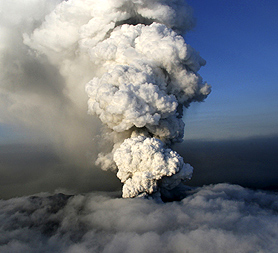Volcanic ash: was air travel ban necessary?
Updated on 20 April 2010
The fallout from the travel chaos is just beginning, with some now arguing that Europe's air traffic controllers over-reacted by deciding to ban air traffic.

Hundreds of thousands of Britons remain stranded abroad. Airlines are losing £130 million a day. So far, the crisis has cost the British economy an estimated £1.5 billion. And with a new cloud coming in from Iceland, Britain's airports look set to remain closed for a sixth day.
But has the air travel ban been unnecessary?
Matthias Ruete, the European Commission's director general of transport, told the Daily Telegraph that Europe's air traffic controllers have over-reacted. He thinks the ban should have been restricted to a 30 miles limit around the volcano.
"The science behind the model we are running at the moment is based on certain assumptions where we do not have clear scientific evidence", he said.
"We do not even know what density the cloud should be in order to affect jet engines. We have a model that runs on mathematical projections. It is probability rather than actual things happening."
The Met Office is responsible for forecasting the movement of the ash cloud for Europe. Its Volcano Ash Advisory Centre was set up in 1986, initially to track the radioactive plume from Chernobyl. Hence, the model used for tracking the ash is called NAME (Nuclear Accident ModEI).
The ash is monitored by satellite imaging and a type of radar called lidar. The model relies on two main sources of information: wind direction and the amount of emissions coming from the volcano.
Although the model is based on sound physics it is not perfect. Dr Grant Allen is a volcanologist at Manchester University: "We simply don't know the wind structure of the atmosphere with perfect accuracy, nor do we know the evolving nature of the plume itself."
But Dr Allen says the computer model forecasts have been validated in the past and have been shown to work well for broad decision making "but they will not be able to perfectly tell you where the plume is to the nearest metre."
The Met Office says its role is to support aviation in its decision-making. In a statement it said, "it is for the aviation industry and regulator to set thresholds for safe ash ingestion."
In the last few days around 40 European airlines carried out test flights, including British Airways on Sunday. Their results suggest the risks to aviation are not as high as computer models predict.
After flying planes in Germany, Lufthansa spokesman Klaus Walther said the airline "did not find the slightest scratch on the cockpit windscreens, on the outer skin nor in the engines."
"The flight ban is completely based on computer calculations and is causing economic damage in the billions," said Walther.
"The test flights so far could well have flown through a patchy part of the plume", says Dr Allen. But the problem may not be the computer models, it's the lack of research into what levels of concentration of ash are dangerous to jet engines.
"No one knows for sure what density of ash plume can bring a plane down" says Dr Allen. "Engineering tests in the ground need to be performed in future so we know exactly what concentrations are dangerous and which are not."
The Flight Safety Foundation is an independent organisation that looks at aviation safety issues. Its chief executive Bill Voss thinks the decision to close airspace was justified initially .
"I firmly believe that if action hadn't been taken very quickly, we could have lost one or more aircraft over the north Atlantic", he says.
But Voss also believes there is a "glaring omission" in the research into the dangers of volcanic ash. "It is an incredibly serious oversight that research has never been carried out into what levels of volcanic ash pose a risk to planes", he says. "This has to happen now."





